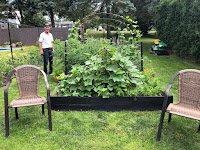A Food Place, A Happy Place, An Escape Place,
A Garden
 |
| My grandmother's 70-year-old peonies on Layton. |
Fresh mulch is heaped around flower beds, tomato and zucchini plants are peeking from the oddest spaces, perennials and annuals are lush up and down the road. Is this any different from other years? The experts say, "Yes!"
One nursery grower reports that seed sales doubled this year, and tomato plants flew off shelves faster than toilet paper.* Mulch salesmen said they had never seen such a high demand. Customers were lined up to have bags and trailers filled. Yards and gardens look gorgeous everywhere.
 |
| John and Colette Hughes' Covid- escape flower garden. |
In 1917 the government asked the nation to plant War Gardens to free up food for our soldiers in World War 1. Americans responded whole-heartedly. And in World War 2, the government changed the name to Victory Gardens and asked the same gardening efforts of its people. In fact, Victory Gardens produced 40% of the nation's fruits and vegetables.*
Covid Gardens have sprouted from the needs of a different kind of war. They are not just food places although staying out of grocery stores and controlling the growth of our own food has wide appeal. Our Covid Gardens have become escape places, happy places, when the four walls of the living room begin to close in.
Several of my favorite gardeners on Layton have made their Covid Gardens virtual Edens.
 |
| Colette, lost in squash. |
My favorite part of their garden? The whimsical trellises John has constructed above the garden where his trained cucumbers climb and provide a shady, peaceful, Covid escape.
 |
| John and his beanstalk |
Keep in mind this is JUST a backyard garden, no acreage, no tractors, an ordinary Layton backyard. Weeding, watering, battling beetles and other critters who come to dine then freezing and canning their harvest dominate the weeks ahead for Colette and John, but they glean joy and personal satisfaction in sharing their bounty as well as a taste of summer throughout the winter.
 |
| John Hughes and his cuke trellis. |
About a quarter mile up Layton, Virginia Richardson tends an English garden. Like its Oxfordshire forbears, the garden incorporates her rolling lawn, groves of trees, and hundreds of flowers. The Richardson family has owned the land for over 80 years, so roots go deep around the house on Layton she shares with husband Reggie.
The largest bed of her many gardens fronts her house and extends close to 100 feet in a sculpted style. Primarily, perenials pack Virginia's gardens. Her favorite flowers are day lilies which can be found in a variety of colors.
 |
| Day lilies in bloom. |
When spring comes, Virginia mans her garden dawn til dusk, weeding, dividing large clumps of roots, replanting bulbs in various other places (including in my yard!). Years of work and long days of grooming have produced a lovely landscape flower garden ... and neighbors, like me, take great pleasure in its beauty.
 |
| Virginia Richardson in her English garden. |
Gardens hold a hint of the divine for, it seems, God loves gardens. He placed His most perfect creations, man and woman, in the most ideal spot to begin life - a garden.
And the night before His Son was to die for the sins of all mankind, God led Jesus to a garden where they could commune. Gardens loom large in His story.
A garden is a microcosm of life: seeds give birth, seedlings soak up the water and sun as they put their roots down deep in the soil. They become fruit and flower bearers, and eventually they die. A picture of our lives.
Jesus' stories, designed to teach us about God and His kingdom, are often about seeds or soil. And when He wanted us to know how to live and walk with God daily, a garden provided the metaphor. The illustration of a vine and its branches (John 15) shows the vital importance of staying connected to God. Jesus said, "I am the true vine, and My Father is the Gardener" (John 15:1). We branches cannot live for God and His glory without abiding in Him, just as a branch takes its nourishment and strength from the vine to which it must be connected.
And the night before His Son was to die for the sins of all mankind, God led Jesus to a garden where they could commune. Gardens loom large in His story.
A garden is a microcosm of life: seeds give birth, seedlings soak up the water and sun as they put their roots down deep in the soil. They become fruit and flower bearers, and eventually they die. A picture of our lives.
Jesus' stories, designed to teach us about God and His kingdom, are often about seeds or soil. And when He wanted us to know how to live and walk with God daily, a garden provided the metaphor. The illustration of a vine and its branches (John 15) shows the vital importance of staying connected to God. Jesus said, "I am the true vine, and My Father is the Gardener" (John 15:1). We branches cannot live for God and His glory without abiding in Him, just as a branch takes its nourishment and strength from the vine to which it must be connected.
When we are rooted and grounded in God, He calls us "a well-watered garden" or "a tree planted by the water that sends out its roots by the stream. It does not fear when heat comes; its leaves are always green; it has no worries in a year of drought and never fails to bear fruit." (Jeremiah 17:8)
Let's work on becoming well-watered gardens,
trees with deep roots,
so viruses, social turmoil, and worries
won't keep us from growing strong and bearing fruit.
Watering my garden and
sending down roots ...
On Layton
Information source: